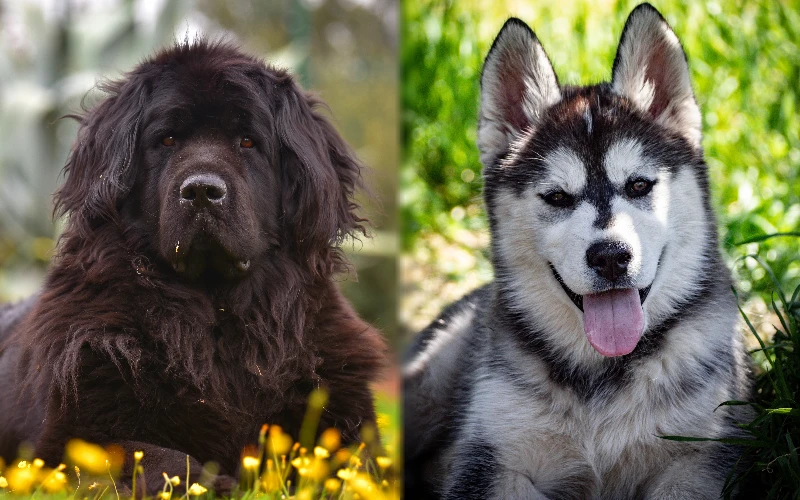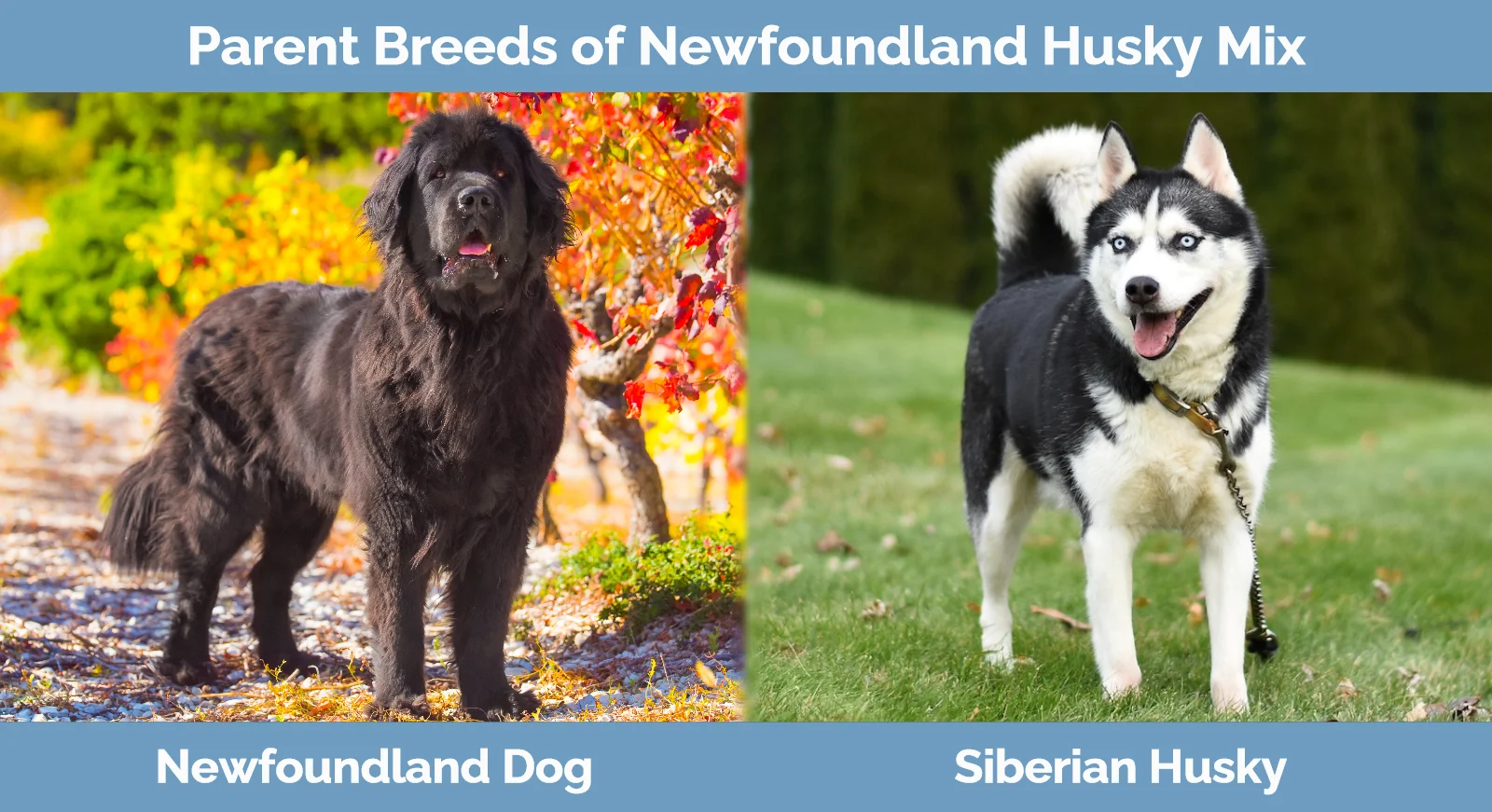Newfoundland Dog Husky Mix Breed Info: Pictures, Temperament & Traits

Updated on

The Newfoundland Husky mix is created by crossing a purebred Newfoundland with a purebred Husky. As such, this dog can inherit qualities from both parents or one parent and it can be difficult to predict personality or appearance. However, like both parents, this dog mix can endure cold temperatures, but hot weather is a challenge.
| Height: | 24–36 inches |
| Weight: | 80–100 pounds |
| Lifespan: | 9–11 years |
| Colors: | Brown, gray, black, or pure color with spots |
| Suitable for: | Active families, people without allergies |
| Temperament: | Loyal, loving, intelligent, easy to train, friendly, gets along with other pets |
The Newfoundland Husky mix, also known as the Newsky, originated from Canada and was initially bred due to the Newfoundland’s water-resistant coat and the Husky’s active nature. Their ability to serve during the harsh Canadian winters, pull a sled, and their gentle nature soon made this dog breed quite popular.
These dogs are very energetic with high prey drives, which makes them great fishing companions. Like Huskies, they are pack animals and do well with other dogs.
Newfoundland and Husky Mix Characteristics
Newfoundland Husky Mix Puppies
Newfoundland Husky Mix puppies are quite rare, and you’ll have to acquire one from a breeder to be certain of their health. Usually, a Newfoundland Husky Mix ranges from $1,000 to $1,500. The price can be lower or higher depending on the various features of the puppy. Ensure you are dealing with an honest breeder since some breeders make false claims. A certified breeder should be willing to show you both parents and their health records. The puppies should also come with a vaccination certificate. You can also adopt one for around $300 from a local shelter—if you can find one that needs a home. However, adult dogs are harder to train and socialize.
Since the puppies typically take after both parents, they are likely to be quite energetic, and you must be ready for this. However, if they take after their Newfoundland parent, they can be quite friendly.

Temperament & Intelligence of the Newfoundland Husky Mix 🧠
The temperament of the Newfoundland puppy is difficult to predict since they can take after both parents or either parent. Newfoundlands are eager to please and loyal, while Huskies are quite independent and stubborn. However, one thing is for sure—they will be highly intelligent since both parents are known for their intellect.
This dog mix is very social, and they don’t do well in isolation. They can develop anxiety if left alone for more than 8 hours. Just like their purebred parents, they do best when a family member is at home during the day or if their workplace is dog-friendly so that they can take them to work. Otherwise, they are prone to panic, cry, bark, or whine when left alone by their owner. If you are away for an extended period, consider getting a dog sitter, especially one with experience handling this particular breed.
Are These Dogs Good for Families? 👪
The Newfoundland Husky Mix is an excellent family dog. Their high intelligence makes it easy to express themselves and read body cues from their human owners and other family members. They are also good for first-time dog owners, especially if they take after their Newfoundland parents due to their easygoing personalities. However, they might be challenging to deal with if they have strong Husky traits.
The Newfoundland Husky Mix is child friendly, but they need to be socialized to deal with young kids since they can get aggressive when playing. However, Newfoundlands are famously good with children and can even babysit. They are also fine for seniors due to their gentle nature, but they require a more active family member to take them on runs and walks.
Does This Breed Get Along With Other Pets?
The tolerance to other animals will depend on what parent they get most traits from. Newfoundlands are very cat-friendly dogs, while Huskies are not very cat-friendly. However, both dogs have a high prey drive and should not be left alone with small pets such as rabbits. They are also very friendly towards other dogs, especially dogs of the opposite gender.
Things to Know When Owning a Newfoundland Husky Mix:
Food & Diet Requirements 🦴
In most cases, the ideal diet depends on the dog’s breed, age, and size. Each dog breed is unique and has different dietary requirements. With the wrong food and diet, the Newfoundland and Husky Mix can become overweight or obese. Since they are prone to hip and elbow dysplasia, consider giving them fish oil and glucosamine supplements and avoid overfeeding them. They also need fresh drinking water at all times.
If you are unsure of what to feed your dog, consider getting recommendations from the vet.
Exercise 🐕
The Newfoundland and Husky mix is a large dog breed and being active prevents them from getting too heavy and developing joint issues. The amount of exercise will depend on which parent your dog takes after. Huskies are highly active and require 2 or more hours of strenuous exercise daily, while Newfoundlands require only 30 to 60 minutes. That means that an average Newfoundland Husky Mix requires at least an hour of exercise.
Some of the best exercises include running, walking, and swimming. You can also play games that will stimulate them mentally and physically. The more exercise they get, the more calm they will be and the easier it will be to train them. Due to their high energy levels, these dogs don’t do well in apartments and they can get quite destructive when they don’t have enough space.
Training 🎾
The Newfoundland Husky puppy mix is intelligent; however, ease in training will depend on a few factors. Newfoundlands are loyal and eager to please, making them easy to train. On the other hand, Huskies are quite independent and are thus tough to train. The parent from which the Newfoundland and Husky Mix takes the most will depend on whether training will be easy or hard. Also, Huskies can be aggressive and rough with small children and must be trained from early puppyhood.
Training needs to be done with a firm hand to know their place. Consider breaking down the training into shorter daily sessions to prevent them from getting overwhelmed and keep their attention span higher. Like most dogs, they respond well to positive reinforcement, so make sure to give praise and treats when they do well. Avoid using aggressive language when training since they tend to be slightly more sensitive than other dogs. If trained properly, this breed can learn how to socialize well with humans and other pets.
Grooming ✂️
Since both parents have a thick double coat, this breed is likely to have a heavy double coat too. Shedding is very common, and you should brush the coat daily to prevent it from matting. They also need to be washed with a mild shampoo every 3 months or so.
Visiting a groomer every 2 months is recommended to trim the coat and toenails to prevent them from overgrowing. Groomers also clean the ears and prevent them from becoming infected. However, you can learn how to groom your dog on your own if you’re willing to learn. Doing so will also help you maintain your dog’s hygiene often and notice any conditions as soon as they develop.
You also need to invest in a vacuum cleaner if you want to keep your floors and furniture clean.
Health and Conditions ❤️
The Newfoundland is a giant breed with several health issues, unlike Huskies, which are quite healthy except for hip dysplasia. Usually, mixed breeds are less prone to diseases that commonly affect the purebred parents. A reputable breeder should offer a health guarantee on the puppies and be honest about any health conditions that can occur.
- Newfoundland Husky Mixes can suffer from some minor conditions, including hip and elbow dysplasia and bloat. Hip and elbow dysplasia occurs when the conformation of the joints is abnormal. The result is osteoarthritis accompanied by acute pain and a reduced range of motion. However, the condition is listed as minor as it is treatable—though not curable.
- Heart problems: Newfoundlands are especially prone to some heart conditions, such as dilated cardiomyopathy, which causes the heart to become large and thin, making it harder to pump blood effectively. If left untreated, it can lead to the dog becoming weak or tired, having labored breath, and collapsing.
-
Hypothyroidism: This is caused by impaired production and secretion of thyroid hormones, resulting in a decreased metabolic rate. Although sex is not a major factor, spayed females are more likely to develop this condition than intact females. Some clinical signs associated with this condition include:
- Dullness
- Lethargy
- Hypothermia
- Thick skin
- Reduced appetite
- Nonpruritic seborrhea sicca
- Cystinuria: This genetic anomaly prevents the kidneys from metabolizing the amino acid cysteine. The most common signs include straining to urinate, blood in the urine, and frequent, small amounts of urination. If left untreated, this condition can be fatal. Treatment involves prescribing medication to reduce sodium and protein, particularly the amino acid methionine, which is one of the causes of cysteine stones.
 Male vs. Female
Male vs. Female
Male Newfound Huskies are usually larger and heavier than females. The males can weigh 130 pounds compared to the females’ 90 pounds. In general, males are significantly more active and protective, and while they are not aggressive, it can lead to problems if the situation accelerates. Males are also more willing to please and like extra attention compared to their female counterparts, who are more reserved.
Females of this breed tend to bond more with one member of the family instead of all family members. Training sessions are thus easier with the person they have bonded to; otherwise, other family members will not get the same level of results no matter how hard they try. Females are also more cautious around kids and other pets than males.
3 Little-Known Facts About the Newfoundland Husky Mix
1. They love swimming
The Newfoundland Husky Mix loves swimming since it’s an energy-intensive activity and loves being in the cold water, especially during summer when temperatures get quite high. Their coat is also water-resistant, preventing them from getting too cold even when temperatures are low.
2. They make great water rescue dogs
Thanks to their muscular build and thick double coat, this dog breed mix is great as a water rescue dog.
3. They are very devoted to their owners
The Newfoundland Husky Mix is a large, strong, and devoted dog even when they get strong independence traits from their Husky side.
Final Thoughts
Newfoundland Husky Mixes are known as gentle giants because of their gentle nature. However, they can be aggressive if they are not properly trained and socialized in puppyhood, especially if they have strong Husky qualities. Make sure to properly train your puppy and make them part of the family very early. If you do this, they will love and be loyal to you and your family.
Featured Image Credit: Left – Pandas, Shutterstock | Right – Saira Sustaita, Unsplash












